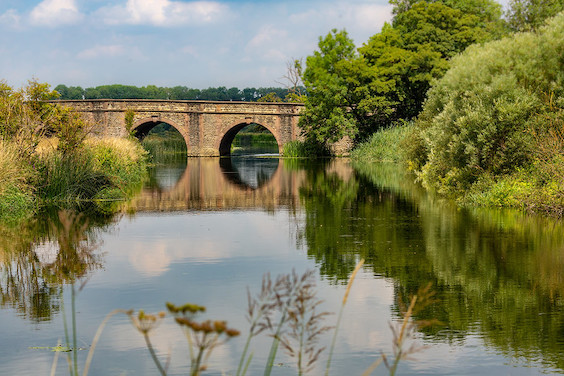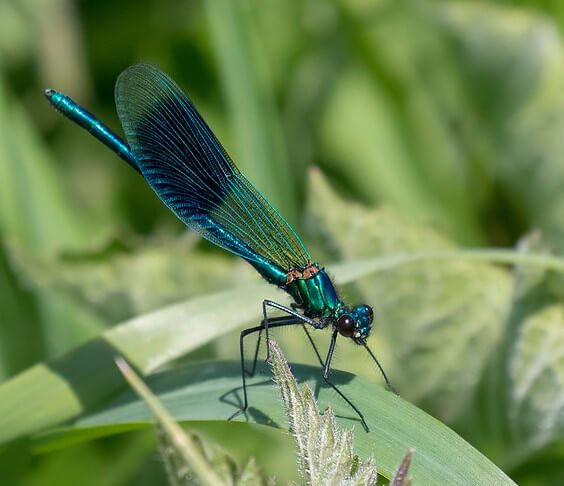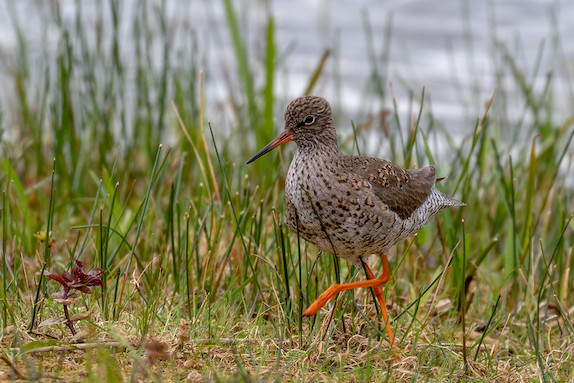- Home
- Northamptonshire walks
Our best walks in Northamptonshire
Looking for the best walks in Northamptonshire?
If you like pretty rural villages with thatched roofs, country lanes, ancient woodland, river valleys and quiet canals, read on!
Whether you're looking for gentle ambles through nature reserves or longer hiking trails, Northamptonshire delivers.
Nestled in the heart of England, the Rose of the Shires is rich in nature. And here's a surprise—the county flower isn’t a rose, but the humble cowslip.
Discovering the best walks in Northamptonshire became a priority for us when we moved just beyond the county’s eastern border in the 1980s.
Over the years, we’ve explored much of the area—one trail at a time—building a long list of favourite nature walks.
Let me show you some of the places we’ve visited and the wildlife we’ve encountered along the way.
Every photo on this page is my own, taken on location during our walks.
We’ll begin our tour in the charming market town of Oundle, close to where we live.
But before you set off, take a moment to check the nature walk checklist so you’ve got everything you need for the journey.
Wherever you walk, listening, watching quietly, and treading gently helps protect the wildlife that makes these places so special. Thank you for caring as you explore.
Barnwell Country Park
This is one of our regular destinations "across the border" from our Cambridgeshire home.
Just outside Oundle town centre, Barnwell Country Park, offers short circular walks around scenic lakes and alongside the River Nene.
It's popular with families and dog walkers, and there's a café, toilets, and a play area for the kids.
On busy weekends—especially in summer—the wildlife becomes surprisingly tolerant of people.
That’s why you might just spot a kingfisher, or even catch a rare glimpse of an otter!
A Christmas Surprise I'll Never Forget:
One Christmas Day, I wrapped up warm and walked to the Kingfisher Hide alone—it was far too cold for my husband to join me!
I sat for hours, watching and waiting in the stillness. Then, just when I least expected it, an otter appeared, swimming playfully in the cold water.
I watched in amazement as it caught a fish, then carried it to a patch of dry land under the bushes to eat in peace.
It felt like the best Christmas present I could have asked for.
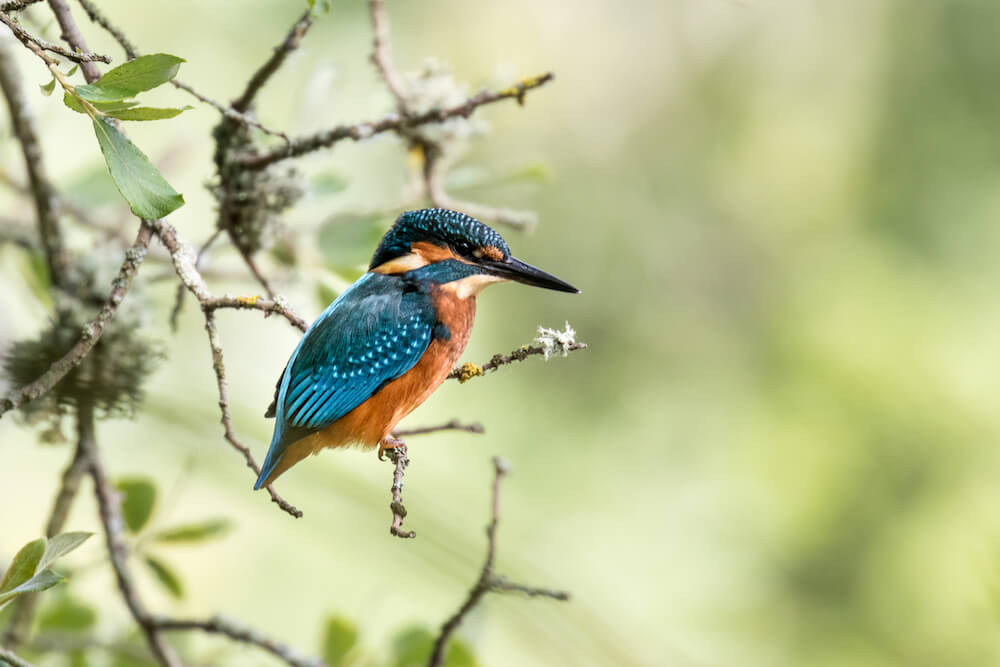 A quiet moment with a Kingfisher—perched and watchful, as if the whole scene is holding its breath.
A quiet moment with a Kingfisher—perched and watchful, as if the whole scene is holding its breath.Glapthorn Cow Pastures
If you prefer peace and quiet, Glapthorn Cow Pastures might be more your style.
This woodland reserve, once part of the royal Rockingham Forest, lies just north of Oundle.
It’s managed by the Wildlife Trust and is one of the few places you might spot the elusive black hairstreak butterfly in summer.
Despite the name, there are no cows here—but you might hear nightingales or see spring wildflowers like bluebells, primroses, and orchids along the woodland paths.
Titchmarsh LNR
Heading west from Oundle, Titchmarsh Local Nature Reserve sits just outside the town of Thrapston.
You can access the reserve from nearby Aldwincle, but parking there is limited—and the potholes can be a challenge! For an easier option, park in Thrapston and enjoy a scenic walk in.
From the town, keep the River Nene on your left and Thrapston Town Lake (used by the sailing club) on your right. Follow the wide footpath until you reach a bridge.
Cross the river, turn right, and pass through the kissing gate—you’ve arrived.
There’s a lovely circular walk around the lakes, about 3 to 4 miles, mostly along grassy paths (which can get muddy in winter).
In summer, this is one of the best spots to see and photograph Banded Demoiselles and other dragonflies.
In winter, large flocks of ducks gather here—and by February, the loud calls of breeding herons fill the air.
Nene Way - One of the Best Walks in Northamptonshire
Did you read that as Neen or Nenn?
You’ll hear it both ways—and whichever one you choose, someone will swear you’re wrong!
The Nene Way is a 70-mile long-distance trail that follows the river from Badby in the west to Wandsford near Peterborough.
I’ve not walked the entire thing (it's a bit much at my age!), but those who have say it's one of the best long walks in Northamptonshire.
A particularly scenic 14-mile section runs from Barnwell to Wandsford. Along the way, you'll pass the site of Fotheringhay Castle.
Though dismantled in the 1630s, its motte (earth mound) remains—and it holds a dramatic past:
- Richard - III was born here
- Mary Queen of Scots was executed on the grounds
It’s a stretch that blends quiet countryside with powerful history.
The Nene Valley Living Landscape
If you're looking for lakeside walks, the Nene Valley is an excellent place to start.
Kinewell Lake
Near the village of Ringstead, Kinewell Lake is a former gravel pit turned wildlife haven. It's now both an SSSI and SPA, home to many protected bird species.
The 1.5-mile trail around the lake is short, peaceful, and ideal for a relaxed stroll.
Dogs are welcome—but please keep them on a lead during the summer bird breeding season.
Stanwick Lakes
Further along the valley, you’ll reach Stanwick Lakes—a countryside attraction and nature reserve with lots to offer.
It’s one of the best places in Northamptonshire to walk with children. There are:
- Adventure play areas
- A visitor centre
- Hard-surfaced, accessible paths
You’ll also spot plenty of ducks, geese, and other waterbirds across its 15 lakes and ponds.
Nene Wetlands & Rushden Lakes
You can continue your walk from Stanwick Lakes into the Nene Wetlands, which includes four nature reserves managed by the Wildlife Trust.
This unique area even borders Rushden Lakes Shopping Centre—a rare blend of wildlife and retail!
As you explore, you’ll find:
- Lakes and islands
- Meadows and reed beds
- Woodland paths
It's a walk with surprising variety—and perfect if you want to combine a nature fix with a coffee or shop stop.
Summer Leys Nature Reserve
Summer Leys is another popular reserve in the Nene Valley—and a favourite among birdwatchers.
The main lake is a flooded gravel pit, surrounded by two smaller ponds and a specially designed wader scrape.
In spring and summer, keep an eye out for lapwings and redshanks nesting here. If you're lucky, you might catch a glimpse of their chicks darting around the water's edge.
And keep your binoculars ready—rare birds often turn up here, including the elusive Bittern, the elegant Glossy Ibis, and the Curlew.
Weekends can be busy, but once you're on the trail, it's easy to find a peaceful rhythm—especially if you stop at one of the many bird hides tucked along the lakeside.
The walk forms a circular route:
- Bird hides line one side of the lake
- An old railway path runs along the other
The paths are called “all weather,” but they can still get muddy in winter—so wear boots or sturdy shoes.
If you explore past the bird feeding station, you’ll cross a grassy meadow with kissing gates at both ends. It’s a beautiful stretch—but it can become very waterlogged, especially after rain.
Irchester Country Park
No list of the best walks in Northamptonshire would be complete without Irchester Country Park.
There are three woodland trails to choose from:
- The Easy Access Trail – a short, 15-minute loop
- The Woodland Trail – slightly longer, with gentle inclines
- The Ironstone Heritage Trail – a 2.5-mile route with historical interest
This area reflects Northamptonshire’s history with ironstone—a sedimentary rock rich in iron ore. You’ll see evidence of old quarries throughout the park.
The Ironstone Heritage Trail also passes the Railway Museum (free to enter), where you can see narrow-gauge trains and indoor exhibits. The volunteers here are always generous with stories and knowledge.
For convenience, there’s a café and toilets near the car park.
We find it’s well worth getting the annual parking permit, which gives you unlimited access to all of Northamptonshire’s Country Parks—including this one.
Twywell Hills and Dales
Once an ironstone quarry in the early 20th century, Twywell Hills and Dales is now a designated SSSI (Site of Special Scientific Interest)—and a real hidden gem for nature lovers.
This is one of the best places in Northamptonshire to spot butterflies. Look out for:
- Dingy Skipper
- Grizzled Skipper
- Common Blue
- And the elusive Green Hairstreak
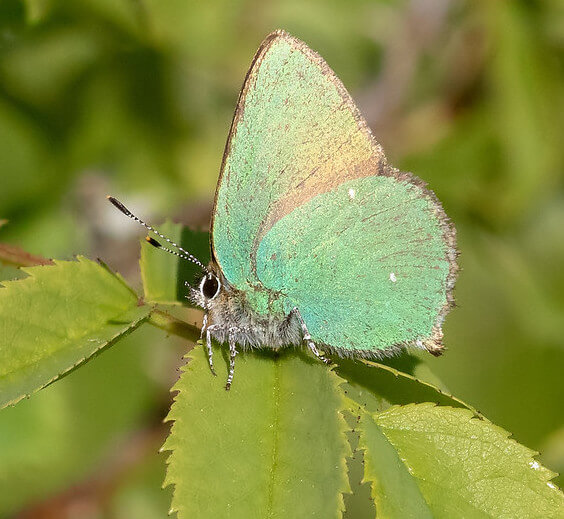 The beautiful Green Hairstreak—still the only one I’ve ever seen, found at Twywell Hills
The beautiful Green Hairstreak—still the only one I’ve ever seen, found at Twywell HillsA Butterfly Encounter to Remember:
On one visit, we’d chatted with a fellow photographer earlier in the day who kindly pointed out a Dingy Skipper—my first ever sighting. So small, but so full of character.
Later, as we followed butterflies deeper into the gullet—an overgrown, sun-dappled pathway—we spotted our new friend ahead.
After a while, he turned and walked back toward us, beckoning with a quiet smile. He had found a Green Hairstreak, holding its ground, guarding its little patch of sunlight.
Thanks to him, we saw it up close and managed to get a few photographs—a truly special moment shared with someone who understood the joy of spotting the rare and beautiful.
Terrain & Access Notes:
As the name suggests, the area features steep hills and uneven ground. Paths are unsurfaced and can become very muddy in wet weather, making it unsuitable for wheelchairs or pushchairs.
Facilities & Parking:
- No public toilets
- Free parking available from dawn till dusk
- Dogs are welcome—but at certain times of year, livestock may be grazing, so leads are essential for everyone’s safety
If you're after a peaceful walk with a chance of spotting rare species, this quiet reserve is well worth the effort.
Fermyn Woods
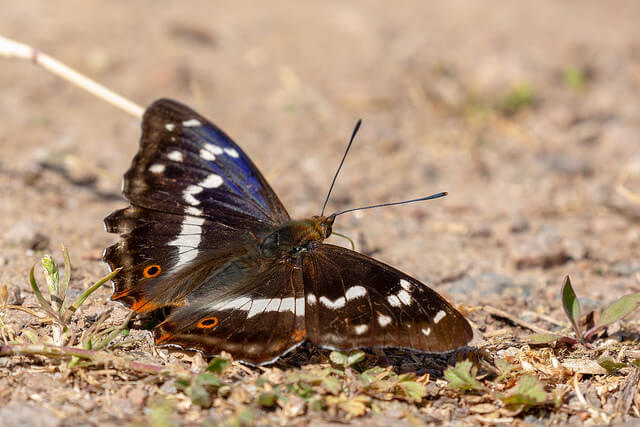 The elusive Purple Emperor—spotting one here always feels like a rare gift
The elusive Purple Emperor—spotting one here always feels like a rare giftJust west of Oundle, near Corby, you'll find Fermyn Woods—once known as Brigstock Country Park.
Good news if you have a parking permit: it’s valid here too!
Choose Your Woodland Walk
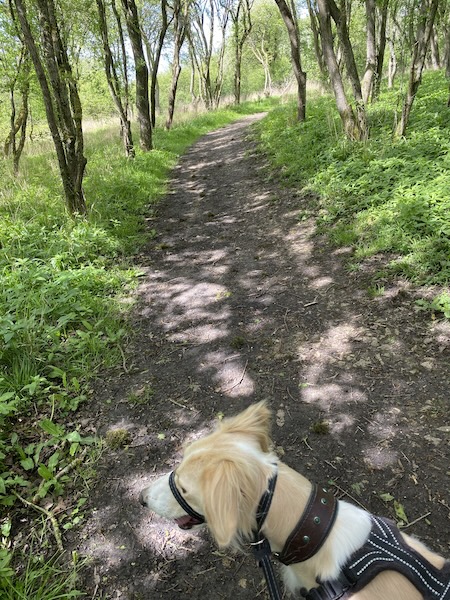 A peaceful walk through Fermyn Woods—dogs are welcome, just bring good boots!
A peaceful walk through Fermyn Woods—dogs are welcome, just bring good boots!Fermyn offers three trails, each starting from the car park (with a café and toilets nearby):
- A short stroll for a gentle outing
- A medium loop through forest paths
- A longer walk that links into nearby trails and the Lyveden Way
As you explore, look out for:
- Red Kites soaring overhead
- Purple Emperor butterflies in July, high in the treetops
- Fallow deer quietly crossing the woodland rides
- And if you’re lucky, Great Crested Newts in the pond
One Unforgettable Newt Hunt
There are two ponds we know of in the park—one larger one that draws in the local fishermen, and a much smaller one tucked beside the trail.
That little pond is home to Great Crested Newts—and we’ve only seen them once. But what a day that was.
Every so often, a newt would rise slowly from the muddy depths, hover just at the surface for a moment, and then vanish again. The water was unusually clear that day, and I spent over an hour trying to photograph them.
I didn’t have much success, but it’s become a bit of a family joke now:
“Don’t tell Carol there are newts in there or we’ll never get home!”
Just a gentle reminder: Great Crested Newts are protected by law here in the UK, so please enjoy them from a distance and avoid disturbing their habitat.
A Hidden Historic Gem: Lyveden New Bield
Just beyond the woods lies Lyveden New Bield, a hauntingly beautiful unfinished Elizabethan lodge owned by the National Trust.
It was meant to be part of an elaborate moated garden design. I’ve spent many happy hours near the moats, watching dragonflies patrol the still water.
The Lyveden Way Trail
Fermyn is also the starting point for the Lyveden Way—a longer circular route that:
- Skirts Lady Wood (a favourite of the Purple Emperor and White Admiral butterflies)
- Passes through Lilford Woods
- Winds its way toward Wadenhoe
- Then returns across open fields to Fermyn Woods Country Park
It’s a peaceful yet rewarding long walk—especially for those who want to blend nature, history, and a bit of solitude.
Brixworth Country Park
Just 5 miles north of Northampton, Brixworth Country Park and the adjoining Pitsford Water Nature Reserve surround a large drinking water reservoir—perfect for peaceful walks and birdwatching.
A causeway splits the site into two distinct areas:
- Brixworth Country Park: family-friendly, accessible, and dog-friendly
- Pitsford Water Nature Reserve: quieter and more wildlife-focused, but requires a permit
What to Expect at Brixworth Park:
- Wide, hard-surfaced paths
- A café, play areas, and toilets
- A sailing club near the dam
- Dogs can walk off-lead, as long as they’re under control
Exploring the Nature Reserve:
If you want to walk the nature reserve loop and visit the bird hides, you'll need a Wildlife Trusts permit.
It’s a lovely, tranquil walk for spotting waterfowl—but dogs are not allowed on this side.
If you’re after both convenience and wildlife, this is a great destination with something for everyone.
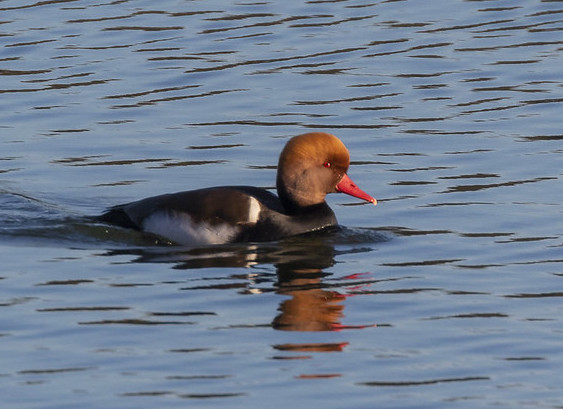 A striking male Red Crested Pochard—regularly seen around Pitsford’s quieter edges.
A striking male Red Crested Pochard—regularly seen around Pitsford’s quieter edges.More country parks
There are still a couple of Northamptonshire country parks we’ve yet to explore—but they’re firmly on our list!
They may well earn a place among our favourites once we’ve had the chance to visit. Here's a quick look at each:
Brampton Valley Way
- A 14-mile linear trail along the old Northampton to Market Harborough railway
- Includes two unlit tunnels—so take a torch and watch for cyclists!
- Ideal for longer-distance walkers and those who enjoy heritage routes
Sywell Country Park (Near Wellingborough)
- Once a reservoir, now a compact country park with a 2.7-mile perimeter walk
- Features include a pond, a butterfly garden, and an arboretum
- Smaller than Pitsford, but sounds promising—we’ll report back once we visit!
We always love discovering new spots, so I’ll be sure to share photos and updates when we get the chance to explore these in person.
I always try to walk gently, watch quietly, and leave no trace behind.
Many of the species mentioned here—like otters, nesting birds, or Great Crested Newts—are protected by law or vulnerable to disturbance.
🐦 Please keep dogs on leads in wildlife-sensitive areas, especially during spring and summer.
📷 If you’re photographing animals, a quiet distance and patience make all the difference—and help keep them safe.
Thank you for respecting the wildlife that makes these places so magical.
Seen something special on one of these walks?
I always enjoy hearing from fellow nature lovers—especially when someone spots something I’ve missed!
If you’d like to share your sightings or tips, feel free to get in touch.
Who knows—you might even spot the next otter or Purple Emperor before I do!

About the Author
Carol is a UK-based wildlife photographer and nature writer with a passion for peaceful walks, patient observation, and capturing life’s quiet wonders.
Through her lens and words, she shares the stories of the natural world — from bluebells and butterflies to birds like the great crested grebe.
Get closer to UK nature
Subscribe to Wild Lens!
Want to discover more hidden walks and wildlife moments?
I’d love to share my latest nature finds, photo tips, and peaceful walk recommendations with you.
💌 Join my newsletter Wild Lens—it’s free, occasional, and always rooted in a love of the natural world.
Subscribe below and come exploring with me.
